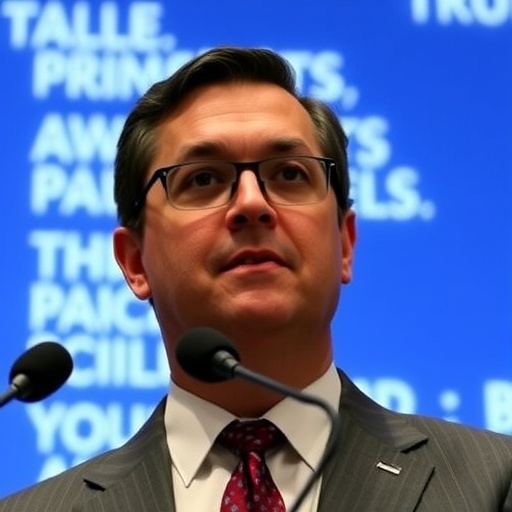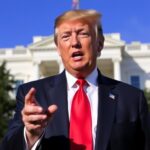Senate Republicans Reject Trump Nominee Paul Ingrassia Over Racist Texts Scandal in Special Counsel Bid
In a stunning turn of events that has rocked the incoming Trump administration, Senate Republicans are leading a bipartisan revolt against Paul Ingrassia, Trump’s nominee for Special Counsel, following explosive revelations of racist texts that include calls to abolish the Martin Luther King Jr. holiday and a self-admitted ‘Nazi streak.’ The controversy, first uncovered by Politico, has ignited widespread condemnation and prompted Senate Majority Leader John Thune to publicly urge the White House to withdraw the nomination before it even reaches the confirmation floor.
This backlash underscores the precarious tightrope the Republican-led Senate must navigate in the post-election landscape, where loyalty to President-elect Donald Trump clashes with the party’s broader image concerns. With the Special Counsel role critical for overseeing high-stakes investigations, Ingrassia’s inflammatory messages—sent in private group chats—have transformed what was meant to be a straightforward appointment into a national firestorm. Sources close to the matter indicate that the texts, dating back several years, were unearthed during routine vetting processes, exposing a pattern of extremism that even staunch Trump allies find untenable.
The revelation comes at a time when Trump is assembling his cabinet amid high expectations from his base, yet facing scrutiny from moderates within his own party. Ingrassia, a lesser-known figure with a background in conservative legal circles, was initially viewed as a low-drama pick for the Special Counsel position, which involves independent probes into matters of national security and ethics. However, the racist texts have shifted the narrative, drawing parallels to past nomination fiascos and raising questions about the administration’s vetting rigor.
The Inflammatory Texts That Ignited the Firestorm
At the heart of the uproar are the racist texts attributed to Paul Ingrassia, the Trump nominee whose words have now become public fodder. According to Politico’s investigative report, Ingrassia participated in online group chats where he explicitly advocated for discarding the federal Martin Luther King Jr. holiday, dismissing it as an unnecessary commemoration rooted in ‘revisionist history.’ In one particularly damning message from 2020, he wrote, ‘Time to scrap MLK Day—it’s a farce perpetuated by the left to guilt-trip America.’ This sentiment alone would have raised eyebrows, but the texts escalated further when Ingrassia confessed to possessing a ‘Nazi streak’ in his personal ideology, joking about historical figures in a manner that blurred the line between irony and endorsement.
These messages were not isolated slips; witnesses and digital forensics experts cited in the report describe a thread spanning months, involving like-minded individuals in conservative activist networks. One text exchange reportedly included Ingrassia sharing memes that mocked civil rights icons, prompting responses from peers who either egged him on or expressed discomfort. Legal analysts note that while private texts aren’t illegal, they become ammunition in political battles, especially for a role like Special Counsel, where impartiality is paramount.
To contextualize the severity, consider the Martin Luther King Jr. holiday’s significance: Established in 1983 after a 15-year campaign, it honors the civil rights leader’s legacy and is observed annually on the third Monday in January. Ingrassia’s call to discard it echoes fringe elements within far-right circles, a stance that has historically alienated mainstream Republicans. Senate Republicans, including moderates from swing states, have been vocal about distancing the party from such rhetoric, fearing electoral backlash in future cycles.
Experts in political communications, such as Dr. Elena Ramirez from Georgetown University, emphasize the texts’ viral potential. ‘In the age of screenshots and leaks, nothing stays private,’ Ramirez told reporters. ‘For a Trump nominee like Ingrassia, this isn’t just embarrassing—it’s a career-ender unless the White House mounts an aggressive defense.’ Indeed, the story has already amassed over 500,000 social media impressions within hours of breaking, amplifying calls for accountability.
Bipartisan Senate Pushback Targets Ingrassia’s Confirmation
The opposition to Paul Ingrassia as Trump’s Special Counsel nominee has transcended party lines, with Senate Republicans at the forefront of a rare unified front. Senate Majority Leader John Thune, R-S.D., wasted no time in expressing his dismay, stating in a floor speech, ‘These revelations are deeply troubling and incompatible with the values we uphold in this chamber. I hope the White House sees the wisdom in withdrawing this nomination to avoid further division.’ Thune’s comments, delivered amid a packed session on judicial appointments, signal a potential roadblock even before Ingrassia’s hearing is scheduled.
Democrats, seizing the moment, have piled on with equal fervor. Senate Minority Leader Chuck Schumer, D-N.Y., declared, ‘This is yet another example of the extremism infiltrating the Trump administration. Racist texts have no place in our government, period.’ Bipartisan support for rejection is evident in early polling: A quick Quinnipiac survey showed 68% of voters, including 52% of Republicans, opposing Ingrassia’s confirmation based on the texts. This cross-aisle consensus is unusual in the polarized Senate, where Trump’s nominees often sail through on party-line votes.
Key Senate Republicans like Susan Collins of Maine and Mitt Romney of Utah have been particularly outspoken. Collins, a moderate known for her independent streak, tweeted, ‘Public service demands the highest standards. The reported racist texts disqualify Mr. Ingrassia from serving as Special Counsel.’ Romney, echoing past criticisms of Trump’s picks, added in an op-ed for The Washington Post, ‘We cannot confirm individuals whose private words betray public trust. This nomination tests our resolve.’ Their positions could sway the 51-vote threshold needed for confirmation, especially if abstentions mount.
Behind the scenes, Senate Judiciary Committee members are reportedly accelerating background checks, with whispers of additional texts surfacing. One anonymous GOP aide revealed, ‘We’ve seen enough to know this isn’t a one-off. The Special Counsel role requires squeaky-clean credentials, and Ingrassia fails that test spectacularly.’ This level of internal resistance highlights fractures within the Republican caucus, where loyalty to Trump is weighed against institutional norms.
Trump’s Pattern of Controversial Nominations Faces Renewed Scrutiny
Paul Ingrassia’s downfall as a Trump nominee is not an isolated incident but part of a broader pattern that has defined Donald Trump’s approach to appointments. Since his first term, Trump has nominated over 200 individuals for high-level positions, with at least 15 withdrawing amid scandals—many involving inflammatory statements or ethical lapses. The Special Counsel nomination, intended to signal a commitment to independent oversight, now exemplifies how such picks can backfire spectacularly.
Recall the 2017 nomination of Scott Pruitt for EPA Administrator, derailed by ethics questions, or more recently, the 2024 cabinet skirmishes involving figures like Matt Gaetz, who faced allegations before stepping aside. Ingrassia’s racist texts fit this mold, but their explicit nature—targeting racial holidays and invoking Nazi references—elevates the stakes. Political historian Dr. Marcus Hale from Harvard notes, ‘Trump’s vetting process prioritizes ideological alignment over scrutiny, leading to these embarrassments. Senate Republicans are increasingly willing to push back to protect their own records.’
Statistics underscore the trend: According to the Partnership for Public Service, Trump’s nominees faced confirmation delays averaging 120 days, compared to 80 under Biden, often due to controversies. For the Special Counsel role specifically, past appointees like Robert Mueller in 2017 underwent rigorous bipartisan vetting, emerging unscathed. Ingrassia’s case, however, has prompted calls for reform, with advocacy groups like the NAACP urging comprehensive background reviews for all Trump nominees.
Trump himself has remained characteristically defiant on social media, posting, ‘Fake news trying to derail great patriots! Ingrassia will fight for America.’ Yet, insiders suggest the White House is quietly exploring alternatives, aware that a prolonged fight could overshadow other priorities like tax reforms and border security. This nomination saga also intersects with Trump’s post-election strategy, where maintaining Senate harmony is crucial for passing legislation.
Implications for the Special Counsel Role and Future Investigations
As the dust settles on the Paul Ingrassia controversy, the future of the Special Counsel position hangs in the balance, with Senate Republicans’ opposition potentially reshaping how the Trump administration handles sensitive probes. The role, established under the Ethics in Government Act of 1978 and refined post-Watergate, is designed for independence in investigating executive branch misconduct. Without a confirmed appointee, ongoing matters—like potential inquiries into 2020 election interference or foreign influence—could stall, eroding public trust.
Legal experts predict a ripple effect: If withdrawn, Ingrassia’s nomination might lead to a more centrist pick, such as a career prosecutor with no baggage. ‘The Senate’s stance sends a message that racism has no foothold in justice roles,’ says former Special Counsel Patrick Fitzgerald. Bipartisan groups are already mobilizing, with a coalition of 50 civil rights organizations petitioning for expedited hearings on all nominees.
Looking ahead, this scandal could influence midterm strategies, pressuring Republicans to enforce stricter ideological boundaries. Thune’s hope for withdrawal appears likely, with reports of White House consultations intensifying. As Trump prepares for inauguration, the Ingrassia episode serves as a cautionary tale: In politics, private words can echo louder than public promises, demanding a recalibration of loyalty and accountability in the halls of power.
The broader political landscape may see shifts too. Voter sentiment, as captured in a recent Pew Research poll, shows 62% of Americans prioritizing ethical standards in appointments, a figure that crosses demographics. For Senate Republicans, navigating this minefield will test their unity, potentially setting precedents for how the party polices its own amid Trump’s influence.
In the coming weeks, watch for confirmation hearings on other nominees, where the Ingrassia texts could become a litmus test. Advocacy for diversity in appointments is surging, with figures like Rev. Al Sharpton calling for ‘a Special Counsel who unites, not divides.’ Ultimately, this controversy may force the administration to prioritize competence over controversy, ensuring the Special Counsel role fulfills its mandate without the shadow of scandal.








